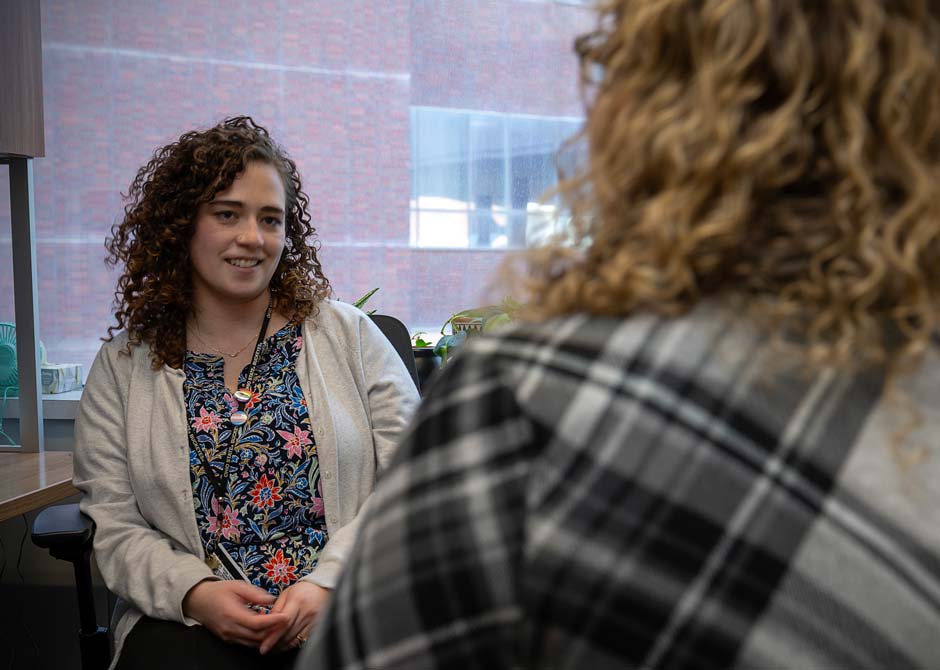 Schizophrenia is a serious mental health condition that can cause people to experience voices not heard by others or experience beliefs not based in reality. The disorder can make it hard for someone to keep a job or take care of themselves.
Schizophrenia is a serious mental health condition that can cause people to experience voices not heard by others or experience beliefs not based in reality. The disorder can make it hard for someone to keep a job or take care of themselves.
If you or someone you know has schizophrenia or is experiencing symptoms of schizophrenia, it can be overwhelming and difficult to figure out what to do next.
The mental and behavioral health experts at The Ohio State University Wexner Medical Center want you to know that help is available and recovery from schizophrenia is possible. Working with health care providers, who are specially trained in managing schizophrenia, can allow you to live independently, function better at school or work, and overall improve quality of life.
The Ohio State Wexner Medical Center in Columbus, Ohio, is a national leader in treating schizophrenia and other disorders that cause psychosis. We’ve assembled a multidisciplinary team in our award-winning EPICENTER program who will work with you and your support network to develop a treatment plan that is both effective and sustainable. We treat people of all backgrounds. No matter one’s race, ethnicity, culture, gender, gender identity, sexual orientation, disability or religion, all are welcome at the OSU EPICENTER. No matter who you are, we will provide the comprehensive care you need to get better.
What is schizophrenia?
Schizophrenia is a serious brain disorder that affects the way someone interprets reality, often leading to hallucinations or delusions. It can interfere with your thoughts, memory, senses and behaviors, making it difficult to complete daily tasks or interact with others.
For friends and family, it can seem as if the person with symptoms isn’t making sense or has lost touch with reality, which can be frightening. Although schizophrenia is a complex illness, it is treatable, especially if the disease is identified and interventions are started as early as possible. That’s why our EPICENTER program exists.
Schizophrenia causes and risk factors
We’re still working to better understand why schizophrenia occurs, so we can better prevent and treat it. Although there is no single known cause of schizophrenia, experts have identified certain risk factors that can increase your chances of developing schizophrenia. It’s important to remember that just because you have one or more of these risk factors, doesn’t mean you’ll have schizophrenia.
Risk factors include:
- Familial history – Having a close relative, like a parent or sibling, with schizophrenia can increase your chances of developing it.
- Prenatal care and birth circumstances – How you developed in the womb and complications at birth can impact your risk of schizophrenia.
- Recreational drug use – Using substances, including marijuana, especially at a younger age, can increase your risk.
- History of trauma or abuse – Trauma can affect your body and your brain, making it more likely that you could develop a psychiatric illness, including schizophrenia.
Schizophrenia symptoms
It’s sometimes difficult for someone with schizophrenia to recognize their symptoms, but often loved ones will. Schizophrenia symptoms fall into five categories:
- Hallucinations – This is when someone hears or sees things that others do not. Auditory hallucinations, which include hearing voices, are the most common, but hallucinations can affect other senses as well.
- Delusions – Those experiencing delusions can have strongly held beliefs, even when there is evidence that the beliefs aren’t true.
- Disorganized thoughts – Schizophrenia can sometimes interfere with your ability to clearly communicate thoughts and feelings to others.
- Disorganized behavior – Individuals can exhibit behavior that is out of character, unpredictable or without purpose. This can include catatonia which may look like someone is not moving, talking, eating or drinking.
- Negative symptoms – This can cause you to isolate and withdraw from family and friends. It can cause a decrease in motivation and a loss of enjoyment in previously enjoyable activities.
These symptoms can have a great impact on someone’s life and lead to many negative consequences. Those could include:
- Having depression, anxiety or suicidal thoughts
- Withdrawing socially
- Being unable to go to school or work
- Turning to drugs, alcohol or nicotine
- Having trouble making decisions or paying attention
- Irritability or aggression
How is schizophrenia diagnosed?
Schizophrenia can be extremely difficult to diagnose for several reasons, including that the person with the disorder is sometimes unaware they’re experiencing symptoms, and early symptoms can be nonspecific. For example, a change in friends, poor grades and irritability can be common adolescent issues as opposed to signs of a mental illness.
That’s why it’s important to undergo a comprehensive psychiatric evaluation with trained medical professionals. To meet criteria for a diagnosis of schizophrenia one needs to experience two of the five key symptoms (hallucinations, delusions, disorganized speech, disorganized behavior, negative symptoms). These symptoms often cause distress and can impact your ability to work, attend school or manage relationships.
Your provider will most likely run a series of tests to rule out other conditions that could cause your symptoms. Those diagnostic tools include:
- Imaging tests, such as magnetic resonance imaging (MRI) or computerized tomography (CT) scans
- Lab testing
Getting an accurate and early diagnosis is key to positive outcomes for people with schizophrenia.
Schizophrenia treatment
Treatments provided by our psychosis experts can help you manage symptoms and achieve a higher quality of life. Usually, the disorder requires a combination of medication, psychotherapy and other interventions, including assistance with work and school.
Medications
A key treatment for schizophrenia is often antipsychotic medications, including long-acting injectable medications. Sometimes these can have side effects, so it’s important to work with your doctor to find what works for you.
Psychotherapy
There are various forms of therapy that can help someone with schizophrenia. Those include individual and group therapy, family psychoeducation and peer support.
Hospitalization and other inpatient programs
During certain periods of crisis, you may need a more advanced level of care to ensure proper safety, nutrition and hygiene. We have psychiatric emergency services, inpatient psychiatric units and partial hospitalization and intensive outpatient programs that can help transition you back to living your life.
Electroconvulsive therapy (ECT)
While not typically needed, ECT is a safe treatment that has shown to be effective for individuals with schizophrenia who may not be benefiting from other treatments.
Specialty programs for schizophrenia
At the Ohio State Wexner Medical Center, we offer these therapies in a collaborative and comprehensive manner. As part of our commitment to provide comprehensive mental and behavioral health services to our community, we’ve created several clinics as part of our psychotic disorders program, EPICENTER, to help people with schizophrenia and other disorders including psychosis, who are in different stages of their disease. These include:
- Risk and Resilience – Clinical High Risk for Psychosis (CHR-P) program, which can help determine if someone has signs or symptoms suggesting an elevated risk of developing a psychotic disorder in the future
- Early Recovery - First Episode Psychosis (FEP) program, which provides specialized, phase-specific treatment for young adults early in the course of a psychotic illness
- Stability and Growth – Longstanding Psychosis program, which provides specialized, longer-term care for individuals experiencing psychosis including to those who have completed our early intervention program
- New Hope - Treatment Resistant Psychosis program (including Clozapine Clinic), which provides medications and care for people with treatment-resistant schizophrenia and psychosis
How to help a loved one with schizophrenia?
Family education and support is also an important part of someone’s recovery from and management of schizophrenia. Ways you can help include:
- Encourage them to see a mental health professional.
- Stay calm and try to avoid arguing about if their symptoms are real.
- Listen, as this keeps the lines of communication open.
- Willingness to supervise or assist your loved one with remembering to take their medication, if needed.
- Keep up your own self-care activities (sleeping, eating and exercise) to support your own well-being during what may be a challenging time.
- Get help in emergencies. Call 911 or 988, if you suspect they might harm themselves or others.




